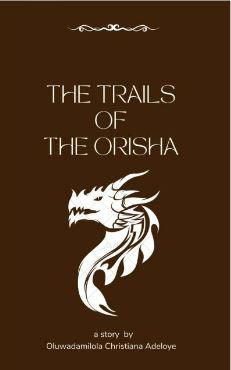
By Chukwuma Ajakah
In this captivating novella, “The Trials of the Orisha”, contemporary African writer, Oluwadamilola Christiana Adeoye, reconstructs a Yoruba mythology about the indispensability of ancestral deities in the affairs of men.
Set in a typical traditional society, The Trials of the Orisha is presented as folktale, embedded with didactic and related folkloric features.
The story rekindles the age-long belief that supernatural forces control the affairs of mortal men on earth.
The plot structure of the novella revolves around a traditional agrarian community whose livelihood is so threatened by an inexplicable drought that they resolve to petition the seemingly uncaring gods.
Rather than assuage their thirst with a miracle, the deities-Obatala, Orunmila and Sango, admit that they too are overwhelmed and can only advise the people to look inwards for solutions to their predicament. Moreover, the gods implore the desperate villagers to be patient as they observe both natural and spiritual laws, maintaining a balance in their relationship with nature, neighbors, their ancestors and the deities.
Believing that the “trials” are temporal, their optimism is stirred to take developmental strides that culminate in all round prosperity for the entire village.
The author combines the omniscient, third person and first-person narrative techniques which enable her to capture the essence of the story. For instance, she portrays the gods as omniscient entities partying in the skies and discussing the affairs of ignorant mortals.
The omniscient technique is deployed in capturing the essence of the ecclesiastical meetings, revealing the deities’ stance:
Obatala, “We cannot end the drought…It is a trial sent by the greater gods to test your strength and resilience. You must learn to live without water and to find new sources of sustenance.” Agreeing with Obatala,
Orunmila says: “But we can give you guidance. Listen to your inner voice and the wisdom of your ancestors, they will show you the way.” “And when you have passed the trial, the will come and bountiful harvests will return,” Sango foretells.
Published in 2022, The Trials of the Orisha is a twenty-three-page fable with four main subject matters-The Trials of the Orishas, The Blessings of the Orishas, The Legacy of the Orishas and The Eternal Legacy. Each subject matter is explored in a chapter while the epilogue encapsulates the plot summary of the four chapters.
Depicting the deities as “Powerful gods”, the author seems to deliberately portray the humans as minor characters. She generally refers to the people as “the villagers”. Not even the king is mentioned by name whereas the gods are duly recognized.
Adeoye explores a wide range of thematic considerations that emphasize the relevance of ancient deities to the society. The overriding themes include tradition, village life, civilization, superstition, communal conflict, peaceful co-existence and influence of the supernatural in the natural sphere.
The language of the novella is relatively simple as the author’s diction largely constitutes easy-to- understand lexical items, images and figurative expressions.
Disclaimer
Comments expressed here do not reflect the opinions of Vanguard newspapers or any employee thereof.